
views
Raising the Issue

Approach your sibling calmly. If you want to confront your sibling about the mess they are making, you should approach them calmly. Many siblings make the mistake of trying to fight or argue to get their way. Your sibling will be much more willing to help you if you speak to them calmly and in a friendly manner. Also make sure you’re not approaching your sibling at a bad time. If they’re stressed, in a bad mood, trying to work, or having any other problem, wait until they’re more relaxed. That way they’ll be more receptive to what you have to say.

Tell your sibling what you’d like them to do specifically. When speaking with your sibling about cleanliness, try to be as direct and specific as possible. Don’t make them guess what messes you’re talking about or what you want from them. Tell them the specific mess you have in mind and how you’d like them to clean it. To be specific, say something like, “I’m wondering if you could clean up around the bathroom sink more. You’re leaving used strings of floss on the counter, and I’d really prefer it if you could just throw them out in the waste basket.” If your sibling is particularly young, you can try drawing a picture for them of what you’d like them to do. This can help them understand what you’re asking and be motivated to help.
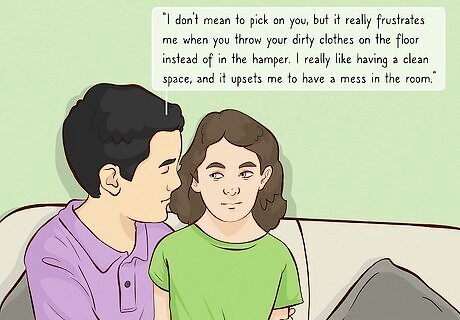
Tell your sibling how their mess makes you feel. In addition to telling your siblings what you want them to do, you should tell them how you feel about messiness in your home. For instance, you can say that you find it disrespectful when they leave their dirty clothes all over a room that you share. Again, though, be calm and respectful. To express your feelings calmly and productively, you could say something like, “I don’t mean to pick on you, but it really frustrates me when you throw your dirty clothes on the floor instead of in the hamper. I really like having a clean space, and it upsets me to have a mess in the room.” Be sure to use “I” statements instead of “you” statements. For instance, you should say something like “I feel stressed out by unclean spaces” rather than “you’re so dirty and disrespectful.”

Compromise when appropriate. If your sibling doesn’t care about mess, you can’t expect them to clean spaces that only they use, like their bed or dresser. Make sure you’re asking them to clean shared spaces and compromising by letting them keep their own spaces how they like them.

Ask your parents or guardians for help. If talking to your sibling on your own doesn’t work, you can try to involve your parents or guardians. The adults in the house will usually be able to influence your sibling more than you can. They also can reward or punish your sibling for their behavior more effectively in most cases. You can ask for your parents or guardians help by saying something like, “I’ve tried to ask Alex to clean up his mess from the living room, but he just won’t listen to me. I don’t want to get him in trouble or anything, but could you please help make Alex clean-up a little more?”
Making Cleaning Fun
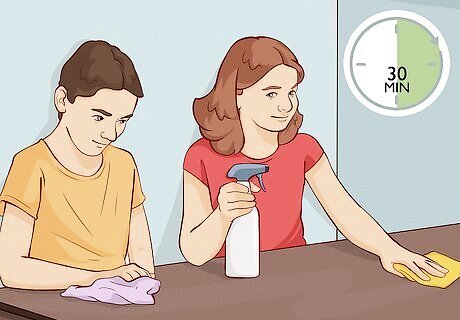
Organize team clean-up sessions. If you organize times when you and your sibling try to clean up messes together, you can make them feel more accountable for cleaning. Also, by cleaning as a team, you might be able to convince your sibling to see cleaning as something that can be social and fun. You can approach your sibling about cleaning together by saying something like, “I know that cleaning isn’t what you like to do after school, but if you and I just took half an hour to pick-up the house tomorrow afternoon, it would really look so much better. Besides, aren’t things usually more fun when we work as a team?”
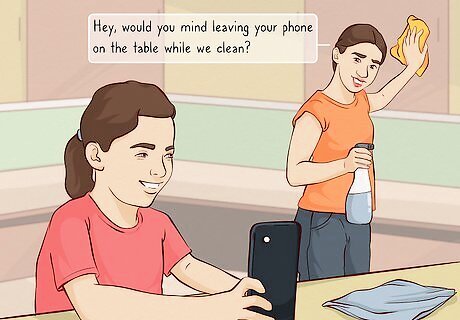
Minimize distractions. Many kids and teens can have a hard time finding cleaning fun if they are tempted by other distractions, like TV or their phones. Even adults have trouble with this! If you create an environment where your sibling can clean without being distracted by something else, you will help them focus on the task they’re doing and find some enjoyment in it. If your sibling is close to your age or older, it might be hard to get them to give up their phone while they clean. If you tell them exactly why you want them to avoid distractions and are very respectful about it, they may go along with your request. To ask an older sibling to avoid distractions while cleaning, you could say something like, “Hey, would you mind leaving your phone on the table while we clean? It will only be fifteen minutes, and I promise you we’ll get so much more done if we just focus.”
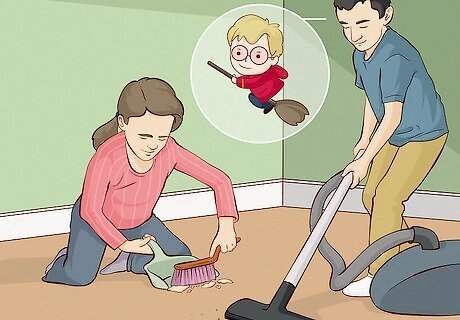
Use make-believe for younger siblings. If your sibling is young or has an active imagination, try to create a story around cleaning. This can help your sibling see cleaning as something that’s fun and important rather than dull. If your sibling really likes Harry Potter, for instance, you can have them make-believe that they’re playing quidditch or fighting a dementor while cleaning. The more you play along with the make-believe, the more your sibling will get into it.

Give rewards for cleaning. You can tell your sibling that they’ll get small rewards for cleaning. If your sibling is young, you can give them a cookie or a sticker when they clean their room. Always be sure, though, that you are able to give them exactly what you promise. Otherwise, you’ll lose their trust and potentially make them dislike cleaning even more. To draw out the prizes for young kids, you can make a sticker chart: Every time your sibling cleans up the room, you can add a sticker to their chart and say they’ll get a prize for every five stickers they earn. This will give them something to work towards. If your sibling is a teen or older, you could reward them by doing a favor for them in return for cleaning. You could also buy them something small that they’d enjoy, like a ticket to a movie they want to see.

Create fun challenges. Some people respond well to challenges, so you can try to turn cleaning with your sibling into a friendly competition. If your sibling is still pretty young, you can put on a song and tell them that you bet they can’t finish what they’re doing before the song is over. This can motivate your sibling to clean faster. If your sibling is closer to your own age, you can set up competitions. For instance, you could have a competition to see who can clean the most windows or pick up the most dirty clothes in 10 minutes.
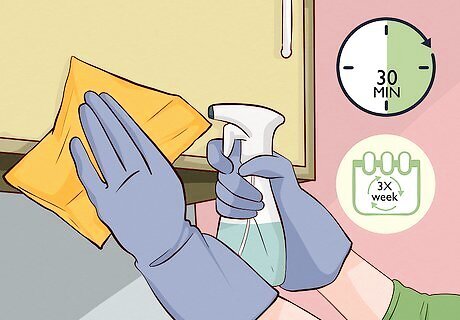
Schedule frequent short cleaning sessions. Sometimes people hate cleaning because they think it takes too long. If you try to schedule frequent brief cleaning sessions for your sibling, you can make cleaning seem easier and maybe even more fun. This will also help your sibling understand that the more often they clean, the less a mess piles up. For instance, you could schedule 30-minute cleaning sessions 3 times a week.

Avoid being critical of their cleaning. If your sibling is making an honest effort to clean, don’t criticize how they’re doing it. This will only frustrate them and make cleaning seem boring and stressful rather than fun and rewarding. Offer constructive criticism by praising them for something they’ve done well and then pointing out an area they could improve on. Keep your tone upbeat and positive when providing constructive criticism.
Reinforcing Cleanliness

Praise the sibling for cleaning up. Ultimately, you want your sibling to start cleaning on their own. You can help make this happen by making them feel proud and accomplished when they clean. Each time they clean something -- even if they didn’t do a great job -- praise them for their effort and tell them how much you appreciate it. You will especially want to praise your sibling if you ever see them cleaning up when they weren’t asked to!

Don't clean up for your sibling. Sometimes people who like clean spaces find themselves frequently cleaning up for others. If you do this for your sibling, you should stop. This will help them to see how much of a mess they are making. Also you will be able to refer to it when speaking with them. If your sibling can never expect you to clean up for them, this might motivate them to become cleaner on their own. If you have been cleaning up for them in the past, they might not have even noticed the mess.
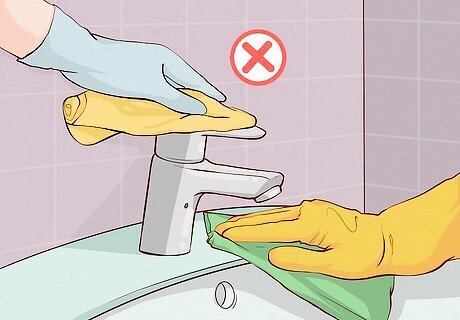
Avoid fixing their clean-up jobs. When your sibling cleans something, try to avoid going back and making it cleaner. You want them feel proud of their work. Over time, you can start offering suggestions of how they can be even cleaner. But again, don’t make them feel bad about the work they’ve done. Instead of fixing their clean-up jobs, you can take the opportunity to offer constructive criticism. Show them specifically what they could do better, but remain positive about their cleaning.

Convince them that cleaning is a good thing. Your sibling may be resistant to cleaning because they’d rather play games or watch TV. You should try to convince them that cleaning is something that they should want to do because it’s nice for everyone else they live with. Even if they’re young, they will often be able to understand this and want to help. You know your sibling well, so just try to express the benefits of cleaning in ways you know they’ll understand. You could try to get your sibling interested in cleaning by saying something like, “I know it’s not as fun as watching TV, but do you see how much easier it is to use the kitchen when you clean your dishes? Everyone else really notices and appreciates your help!”




















Comments
0 comment